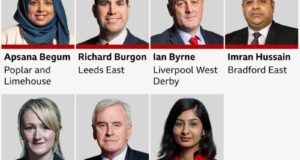
Boris Johnson is continuing to appoint more new ministers during his second full day as prime minister.
Nick Hurd becomes a Northern Ireland minister, while George Freeman has been given a transport brief.
Michael Ellis becomes the new solicitor general, replacing Lucy Frazer, whom Mr Johnson made a justice minister on Thursday.
The new PM is making changes to lower-ranked jobs, following a radical overhaul of his cabinet on Wednesday.
Mr Johnson also confirmed he would change his own official title to include “minister for the Union” – a pledge he made during his leadership campaign.
A Downing Street spokesperson said this was a “statement of his commitment” to strengthening ties between the constituent parts of the UK.
As ministerial appointments were announced on Friday, it was confirmed that, in addition to his new role at the Northern Ireland Office, Mr Hurd would remain minister for London.
However Lord Bourne of Aberystwyth, who had been a junior housing minister and junior minister at the Wales Office, said he was quitting government over Boris Johnson’s Brexit strategy.
He posted on Twitter that he had been asked to continue in both roles, but declined because “I cannot accept a no deal on 31 October”.
Who is in charge of what?
Other new appointments include:
Baroness Goldie – defence minister
Lord Ashton of Hyde – Lords chief whip
Nadhim Zahawi – junior business minister
Ministers confirmed as remaining in their posts include:
Baroness Williams of Trafford – Home Office and equalities minister
Lord Ahmad of Wimbledon – minister at the Foreign Office
Lord Callanan – Brexit minister
Kelly Tolhurst – junior business minister
John Glen – Economic Secretary to the Treasury
Graham Stuart – junior international trade minister
Victoria Atkins – junior Home Office minister, and minister for women
After appointing a new cabinet on Wednesday, with Sajid Javid as chancellor, Dominic Raab as foreign secretary and Priti Patel as home secretary, Mr Johnson began the complex job of reshuffling the rest of his government team.
Among a series of ministerial changes announced on Thursday, long-time ally Kit Malthouse was given a role taking over policing at the Home Office, and George Eustice returned to an environment brief.
Choosing a team is a hard job for prime ministers, with the possibility that those sacked – and those overlooked for a role – will become embittered.
On Thursday, former Brexit minister Steve Baker turned down a return to a junior job within the Department for Exiting the European Union.
The pro-Leave MP said he could not “repeat [his] experience of powerlessness” in the role.
While Brexit Secretary Steven Barclay will nominally lead any future negotiations with the EU, most of the key work is expected to be done by No 10 and the Cabinet Office.
Michael Gove has been put in charge of overall planning for a no-deal Brexit, including its potential implications for Scotland, Wales and Northern Ireland.
As chancellor of the Duchy of Lancaster, a senior ministerial role without a specific portfolio, he will chair a number of key committees and taskforces.
Leaving his house for work on Friday, Mr Gove said Mr Johnson had “got a united cabinet and a united Conservative Party”, adding: “The prime minister has got off to a fantastic start.”
Margot James, who resigned as a culture minister earlier this month to back a bid to stop a future PM suspending Parliament to force through a no-deal Brexit, said Mr Johnson’s appointments represented a “massive shift to the right”.
In an interview with the Guardian, she said she could not have served under him because of his pledge to leave the EU by 31 October in all circumstances.
She added that she would not be able to campaign as a Tory candidate if the party went into a general election advocating a no-deal exit.
Asked if she could quit the party, she added: “I am really going one month at a time now. My goal is to make sure we leave in an orderly way with a negotiated settlement.”
Under UK law, a government is allowed a maximum of 109 paid ministers, of which up to 23 can be full cabinet ministers – including the PM.
 Weekly Bangla Mirror | Bangla Mirror, Bangladeshi news in UK, bangla mirror news
Weekly Bangla Mirror | Bangla Mirror, Bangladeshi news in UK, bangla mirror news







